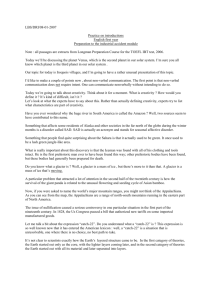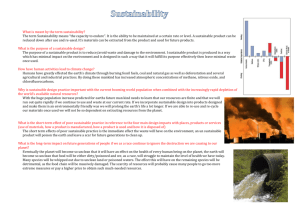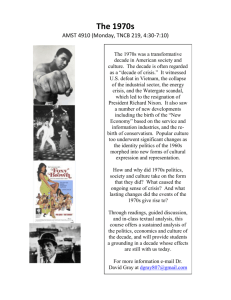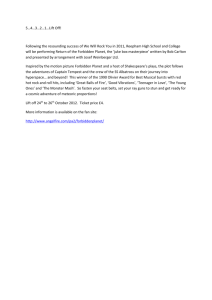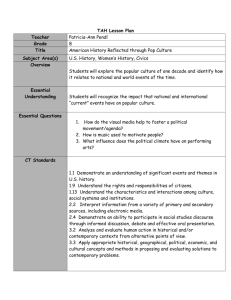Tracking the future: global trends that will affect the world in the next
advertisement
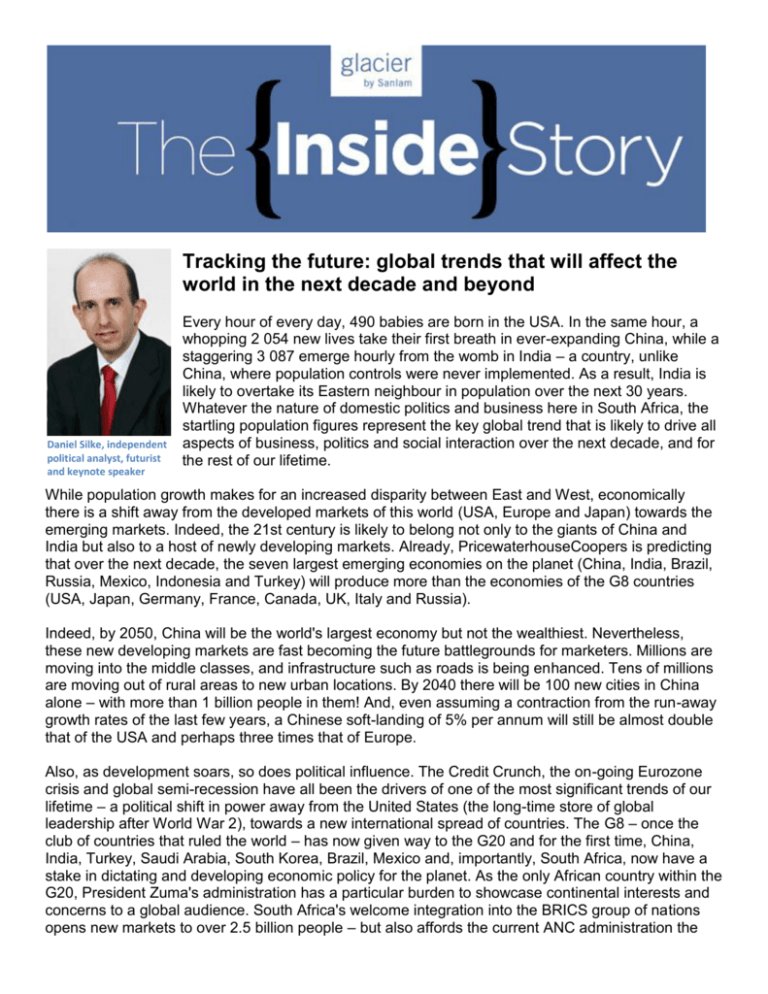
Tracking the future: global trends that will affect the world in the next decade and beyond Daniel Silke, independent political analyst, futurist and keynote speaker Every hour of every day, 490 babies are born in the USA. In the same hour, a whopping 2 054 new lives take their first breath in ever-expanding China, while a staggering 3 087 emerge hourly from the womb in India – a country, unlike China, where population controls were never implemented. As a result, India is likely to overtake its Eastern neighbour in population over the next 30 years. Whatever the nature of domestic politics and business here in South Africa, the startling population figures represent the key global trend that is likely to drive all aspects of business, politics and social interaction over the next decade, and for the rest of our lifetime. While population growth makes for an increased disparity between East and West, economically there is a shift away from the developed markets of this world (USA, Europe and Japan) towards the emerging markets. Indeed, the 21st century is likely to belong not only to the giants of China and India but also to a host of newly developing markets. Already, PricewaterhouseCoopers is predicting that over the next decade, the seven largest emerging economies on the planet (China, India, Brazil, Russia, Mexico, Indonesia and Turkey) will produce more than the economies of the G8 countries (USA, Japan, Germany, France, Canada, UK, Italy and Russia). Indeed, by 2050, China will be the world's largest economy but not the wealthiest. Nevertheless, these new developing markets are fast becoming the future battlegrounds for marketers. Millions are moving into the middle classes, and infrastructure such as roads is being enhanced. Tens of millions are moving out of rural areas to new urban locations. By 2040 there will be 100 new cities in China alone – with more than 1 billion people in them! And, even assuming a contraction from the run-away growth rates of the last few years, a Chinese soft-landing of 5% per annum will still be almost double that of the USA and perhaps three times that of Europe. Also, as development soars, so does political influence. The Credit Crunch, the on-going Eurozone crisis and global semi-recession have all been the drivers of one of the most significant trends of our lifetime – a political shift in power away from the United States (the long-time store of global leadership after World War 2), towards a new international spread of countries. The G8 – once the club of countries that ruled the world – has now given way to the G20 and for the first time, China, India, Turkey, Saudi Arabia, South Korea, Brazil, Mexico and, importantly, South Africa, now have a stake in dictating and developing economic policy for the planet. As the only African country within the G20, President Zuma's administration has a particular burden to showcase continental interests and concerns to a global audience. South Africa's welcome integration into the BRICS group of nations opens new markets to over 2.5 billion people – but also affords the current ANC administration the chance to learn from both best and worst practice in these nations. Consumers are therefore emerging from new regions. A billion new consumers will enter the global marketplace in the next few years – and have almost $10 trillion to spend! Witness therefore the shift in retail expansion to Asia and the Middle East – and Africa is not far behind either. Africa is richer than many of us think. Gross National Income Per Capita is greater than that of India. The Gross National Income of the 12 richest African countries is greater than that of China. Half of Africa's population is under 24 and with a future middle class of almost half a billion, Africa will also be a driving force behind the world economy in decades to come. Also, don't forget an ageing world in which 'grey' demographics or 'silver' consumers become more prolific. The new consumer mix will also add more than a billion women to the global workforce over the next decade, as cultural and religious constraints wane to allow women greater economic freedom and flexibility. All these developments are fuelled by a rapid technological shift that combines both science and technology to bring substantial benefits to the planet. While we are all likely to live longer due to advancements in health-care, we are also more integrated with the world as a result of computer advances and social media. In the time it has taken you to read this article, your friends could be twittering all their business experiences (good and bad) to an audience of thousands. Technology has made us all consumer advocates and once we discover new products (and new ways of doing business) we are quick to share them with everyone in our network. Social networking will enable lightning-fast connections and also provide the youth with endless possibilities of global networking that were once the stuff of science fiction movies. If this is not enough, the digitisation of manufacturing via advances in 3-D printing technologies will enable us to customise the manufacturing of products within the comfort of our own home – potentially turning existing patterns of commercial and labour relations on its head. Certainly challenges remain to test us. The global recession has seen a statistical recovery in stock prices and asset values, but the human side of the economic collapse remains. Millions remain unemployed and there are many people on the planet who have seen little change to their world, even with innovation and progress. These future trends are just a few of the dramatic issues that will impact every aspect of our work and play. Being aware of their implications for personal and commercial activity is critical in these challenging times. Daniel Silke is an independent political analyst, futurist & keynote speaker. www.danielsilke.com. Glacier Financial Solutions (Pty) Ltd, A member of the Sanlam Group Reg No 1999/025360/07 Licensed Financial Services Provider Refer to the Glacier website for details of directors



